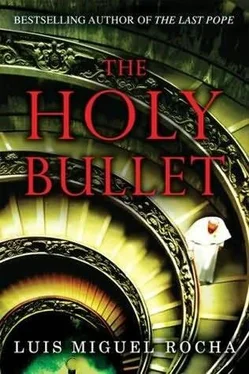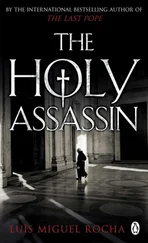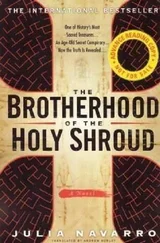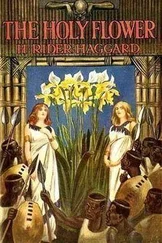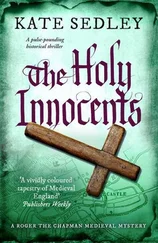How was it possible that the conclave began that Saturday with a surprising six votes for him, and by the sixth round, before lunch, he’d received fifty-two? During the days of preparation for the conclave several cardinals calmed the partisans by hypocritically announcing during dinners and other holy encounters they were not candidates. Wojtyla and the others knew who the favorites were: Siri and Benelli-the first an ultra-conservative with a very bad reputation, the second in the liberal line of his friend John Paul I. He went over to discuss the chances of the Genovese and Florentine with Koenig, the influential Austrian cardinal.
“The conclave is for those runners who come from behind, Karol,” Koenig answered him. “Those who enter the conclave as popes normally leave as cardinals.”
“I know that, Franz. But I don’t believe that this conclave will have the surprises of the previous one,” Karol offered sincerely. Both spoke the living language that they shared between them, Italian. Koenig with a German accent and Karol as flawlessly as a native speaker.
“One never knows,” Franz Koenig said, giving him a pat on the shoulder. “One never knows.”
The first vote revealed a trend plainly along the lines of the Pole’s thinking. Siri ahead with twenty-three votes, followed by Benelli with twenty-two, Ursi with eighteen, Felici with seventeen, Pappalardo with fifteen, and… Wojtyla with five, probably out of goodwill, five souls whom he had treated with prudence in the recent past. Let the fact be noted we are not dealing with a sporting event or other competition, but with something done in the most sacred spiritual togetherness, and any resemblance to a disorderly dispute is false. These are saintly formulas for electing a saint. The method of communication with the Father and the description of the results are merely illustrative. When it is said Siri leads with twenty-three votes, one shouldn’t imagine fans shouting his name.
In the second round of Saturday, Benelli had forty votes, Felici thirty, and Siri had fallen to eleven. Ursi maintained eighteen votes, Pappalardo dropped off the list, and Wojtyla, somehow, had raised his stock to nine. At that moment he didn’t worry about it; those votes would be out of sympathy, nothing sustained or sustainable. In a little while he’d drop off the list, like Pappalardo. He’d be back in Krakow by the end of the week at the latest.
Sunday would start with three sessions, although Benelli shouldn’t need them all. He would be pope by the end of the day or before, Karol Wojtyla thought naively, unaware of the machinations of his great friend. The first session of the day, third of the general conclave, gave forty-five votes to Benelli, twenty-seven to Felici, an unusual eighteen votes to Ursi, and the same nine to Wojtyla. Thirty more and Giovanni Benelli would obtain the two-thirds plus one necessary, not very problematic.
In the following round, Benelli, still ahead, achieved sixty-five votes, Ursi four, and Wojtyla advanced to twenty-four. A new candidate emerged, Giovanni Colombo, archbishop of Milan, with fourteen votes.
Before the last vote of the day, Cardinal Colombo presented a petition asking not to be considered in the subsequent sessions. So, Benelli had seventy votes, five less than needed for the papacy, and Wojtyla received forty. He returned to cell number 91 after dinner with some anxiety, but not much. Benelli was close to the votes needed to become the next Supreme Pontiff. By morning everything would be resolved in favor of the Florentine. Wojtyla prayed for Benelli to obtain the necessary enlightenment to guide the Church in its next years. With the third pope in the same year, they needed stability.
So Monday morning and the sixth round surprised Wojtyla on hearing his name fifty-two times, while Benelli saw his number reduced to fifty-nine votes. As conclaves go, when one lost ground, one never recovered.
Now you know why the cardinal from Krakow looked at his cannelloni with no appetite. His nerves gripped his stomach, and he was left pale, breathing hard.
“The conclave is for dark horses, Karol,” the Pole heard. It was Franz Koenig sitting down by his side. Karol’s compatriot, Wyszynski, was with him.
“This is your work,” Wojtyla accused him, looking at his companion.
“Mine?” the Austrian replied with a smile. “No, Karol. This is your work.”
“Everything is going to turn out well,” Wyszynski added in support.
The three men got up and went to the chapel. Wojtyla’s plate remained untouched through the entire meal.
“Do you remember what Willebrands said to Luciani in the last voting?” Koenig asked in a low voice.
“I was not close to him in the last conclave.”
“I was. And when Luciani began to panic at his imminent election, Willebrands told him a great truth: ‘The Lord gives the burden, but also the strength to bear it.’ ”
“Don’t wish to be in my place, Franz. I hope Benelli recovers and puts an end to this right away.”
They got in line for the orderly entrance into the chapel. Nothing in this place was disorderly, everything according to the standards of God the Father Almighty, Creator of Heaven and Earth. Karol Wojtyla closed his eyes and took a deep breath. Everything would be as He desired. Benelli or him. What shall be shall be.
A little farther behind in line Franz Koenig rejoiced in his work. Since the beginning, he had carried out a strategy that would lead to the election of Karol Wojtyla. He had spoken with the majority of his non-Italian colleagues, given them works by Wojtyla to further convince them. Nothing like a little publicity, not deceitful, since Wojtyla was a serious man with integrity. All this with Wojtyla completely unaware. Enough of Siri, Benelli, and Felici. They all had their good qualities, of course. All right, Siri might not have any, but it was a moment for change. The time of the Italians must come to an end. The seventh session of voting, the same ritual of eight centuries, the days of black and dirty white smoke, the suspense, the frustrated, expectant onlookers in Saint Peter’s Square. Two hundred thousand people in that place, on constant watch, and a million ears pressed to the radio and eyes glued to the television. There were also all the experts and the curious, unmotivated by religion, and those fond of spectacle. The recount threw seventy-three votes to Wojtyla and twenty-eight to Giovanni Benelli. Two votes more and Karol Wojtyla would never see Krakow with the eyes of a cardinal, but only as pope on brief visits. This thought daunted his heart and his eyes watered with emotion.
At five-twenty in the afternoon, according to the watches, whether more or less on time, Wojtyla became the first non-Italian pope in more than four hundred fifty years of history. The last one was a Dutchman, Adrian VI, elected in 1522, very unpopular in Rome for defending and referring in one of his works to the haeresiam per suam determinationem aut decretalem asserendo , which meant that the popes could commit errors in matters of faith. Sacrilege. Sacrilege. He died little more than a year after his enthronement, leaving behind no desire to remember him.
The two hundred sixty-fourth pope of the Catholic Church put his hands to his head and began to weep, spreading emotion through the chapel that turned into moderate applause. Cardinal Jean-Marie Villot, chamberlain to the pope, and the equivalent of interim pope, a duty that only exists from the death of a pope until the election of the successor, approached Wojtyla with a frown, a sign of solemnity.
“Do you accept your canonic election for Supreme Pontiff?”
With wet eyes Wojtyla raised his head and looked at everyone. Tears slid down his face.
“With obedience to the faith of Christ, Our Lord, and with confidence in the Mother of Christ and in the Church, in spite of great difficulties, I accept.”
Читать дальше
